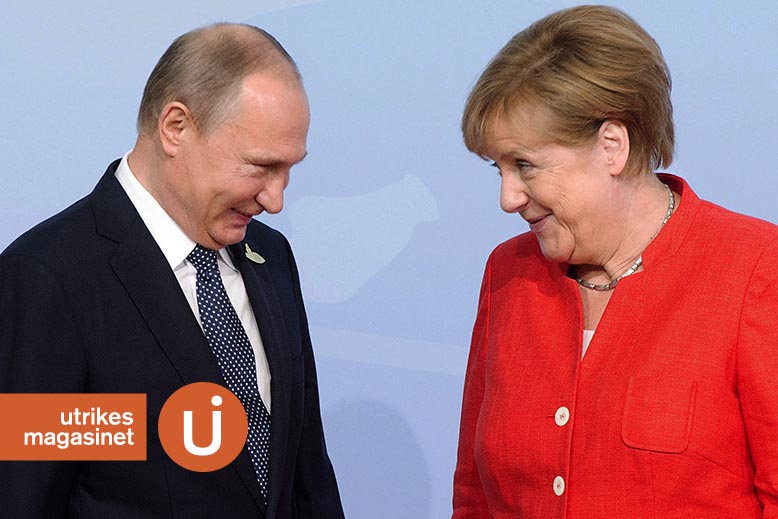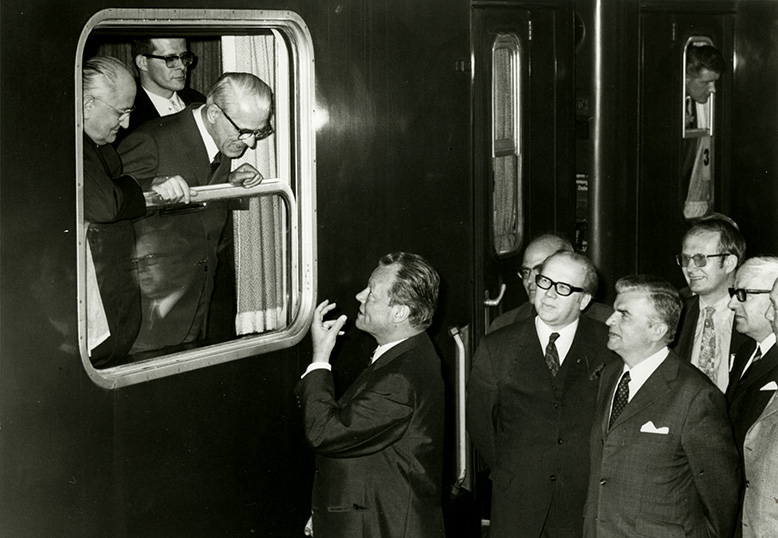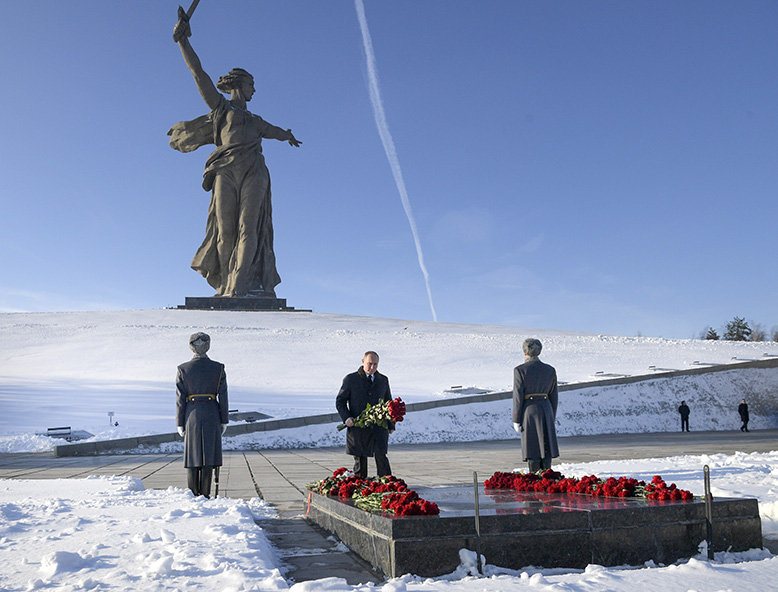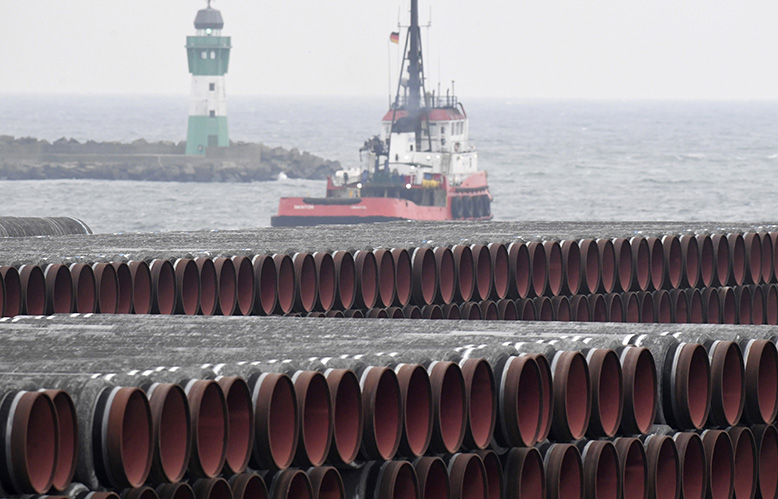
Putin and Europe – À la recherche du temps perdu
It is highly unlikely that Vladimir Putin is a connoisseur of Marcel Proust’s literary imagination. And yet in a way the Kremlin leader’s warped sense of history, revealed once again in his recent disquisitions on the origins and outcomes of the Second World War, is "Proustian" in that he appears to be desperately "searching for lost time" – when Russia (in its Soviet guise) dominated eastern half of Europe and was on the friendliest of terms with Germany. Much as he is concerned with the past, though, Putin is above all a consummate manipulator who instrumentalizes history in pursuit of political ends, writes historian Igor Torbakov.
Publicerad: 2021-07-04
It is well known that the Russian president likes to masquerade as a history buff. Not only is Putin a voracious reader of historical literature. He also manufactures “history” himself. The last time Putin wielded his “historical” pen was just several days ago. On June 22, the 80th anniversary of Nazi Germany’s attack on the Soviet Union, Die Zeit, a well-respected Hamburg-based newspaper, ran Putin’s short essay entitled “Being open, despite the past.” This piece is thematically connected with a much lengthier treatise – a 9000-word article entitled “The Real Lessons of the 75th Anniversary of World War II,” which Putin published exactly a year ago, in June 2020, in The National Interest, a Washington-based policy journal.
At first blush, these are two very different texts, particularly as far as the general tenor of each of these articles is concerned. Putin’s 2020 essay is an angry and highly polemical pamphlet. It accuses the West of hypocrisy and double standards, blasting pre-1939 duplicitous Polish policymakers, the myopic Neville Chamberlain, the morally questionable “appeasement policy,” and the despicable 1938 “Munich Betrayal” that resulted in the partition of Czechoslovakia and the annexation of Sudetenland by Nazi Germany. By contrast, Putin’s Die Zeit op-ed is conciliatory if not downright friendly in its tone: it gratefully remembers Russia’s allies in the anti-Hitler coalition, sings paeans to “our common victory,” and resurrects the compelling image of “Greater Europe” with Russia cast as the European Union’s potential strategic partner.
Using History to Control
But make no mistake: there are more similarities than differences between the two articles. At bottom, both texts represent a classic example of how history is abused in an attempt to control contemporary political narrative. They also clearly identify the epoch which Putin wistfully remembers as “lost time”: the period of Soviet overlordship of Eastern Europe that coincided with Germany’s Ostpolitik from 1970.
 The best of times. West German Chancellor Willy Brandt (centre) bids farewell to East German Prime Minister Willi Stoph following a meeting in Kassel in 1970. Photo: akg-images/TT
The best of times. West German Chancellor Willy Brandt (centre) bids farewell to East German Prime Minister Willi Stoph following a meeting in Kassel in 1970. Photo: akg-images/TT
In his National Interest essay, Putin made no bones about what caused his ire. The European Parliament resolution on the Importance of European Remembrance for the Future of Europe adopted on September 19, 2019, “directly accused the USSR together with the Nazi Germany of unleashing the Second World War,” he lamented. It is a provocative and dangerous move, Putin said, as it betrays the intention to destroy the post-war world order. The latter of course is the one in which the USSR (and Russia as its legal successor) has played a leading geopolitical role, being a key member of the coalition of victorious powers.
Two Different Narratives
As history is written by the victors, two principal historical narratives for decades dominated the scene—one advanced by the Western Allies, the other by the Soviets. These narratives had quite a lot in common—both highlighted the glorious victory over Nazi Germany, successful postwar reconstruction and the long period of postwar peace and economic development. Other (potentially dissenting) European voices were hushed up and basically inaudible. But the crumbling of the Cold War order revealed the plurality of Europe’s "mnemonic communities".
As East Europeans are now pushing for the reintegration of their disastrous war and postwar experiences into a pan-European narrative, two main pillars of the erstwhile historical consensus particularly cherished by Russia -- the notions of the antifascist good’s triumph over the Nazi evil and of the Red Army’s liberation of Eastern Europe -- have come under severe attack. By contrast, the new interpretation advances the notion of the Nazi-Soviet equivalence and rejects the Soviet/Russian claim to the mantle of "Europe’s liberator" by branding the Soviet postwar policies in Eastern Europe as an act of occupation.
 Important memories. President Putin cherishes the Soviet Union's efforts in WWII by attending a ceremony in Volgograd (formerly Stalingrad) to mark the 75th anniversary of the Battle of Stalingrad. Photo: Alexej Druzjinin/AP/TT
Important memories. President Putin cherishes the Soviet Union's efforts in WWII by attending a ceremony in Volgograd (formerly Stalingrad) to mark the 75th anniversary of the Battle of Stalingrad. Photo: Alexej Druzjinin/AP/TT
These historiographical debates over the “correct” interpretation of past events are effectively the struggle over power. The thing is that so long as the old historical consensus remained intact, Russia’s victory over Nazism legitimized its great power status in Europe and its sphere of influence in the eastern part of the continent. The new historical controversies over the nature of Soviet “liberation” of Eastern Europe and over Stalin’s purported equivalence with Hitler effectively undermine Russia’s status as the “liberator of Europe” and erode whatever symbolic capital it might claim to prop up its pretense to being a benefactor of Eastern Europeans.
The Notion of Liberty
What we are witnessing is basically a “clash” of two very different notions of “liberation.” In today’s Europe (and, for that matter, the United States), the liberation of Europe in WWII is inseparably welded with the idea of democracy—the restoration of democratic order in that part of Europe which was cleansed by Western Allies of the “brown plague.” Such interpretation presupposes that whatever the Soviet Union did in the eastern half of Europe that fell under Stalin’s control could be called anything but “liberation.”
In his lengthy essay Putin didn’t address the thorny issue of the ruthless methods Moscow used – both during WWII and in its immediate aftermath – to build its “outer empire” in the shape of the “Eastern Bloc.” Instead, he accused his “opponents in the West” of “historical revisionism” and sang praises to the creators of the postwar international system “that has become the quintessence of the intellectual and political quest of several centuries.” He has made absolutely clear that he deplores the cardinal changes that took place since the late 1980s and craves the restoration of the ancien regime of the Cold War era that granted the great powers control over spheres of influence and allowed them to make all sorts of geopolitical deals over the heads of the smaller nations – all those pesky Balts, Poles, and Ukrainians.
Germany in Focus
In Die Zeit commentary Putin does exactly that: he ignores “Russophobic” Eastern Europeans and directly addresses Europe’s pivotal state – Germany. He has dusted off Charles de Gaulle’s vision of a Europe “from the Atlantic to the Urals” and argued that the foundations of such Greater Europe were built in the process of the Russo-German “historical reconciliation” in 1970 which subsequently evolved into the mutually beneficial cooperation between the two states, spanning half a century -- from the “pioneering” agreement of gas supply from the Soviet union to West Germany to the controversial Nord Stream project.
 Controversial cooperation. Pipes for the Nord Stream 2 Baltic Sea gas pipeline from Russia to Germany are stored at the port of Mukran near Sassnitz. Photo: Stefan Sauer/DPA/TT
Controversial cooperation. Pipes for the Nord Stream 2 Baltic Sea gas pipeline from Russia to Germany are stored at the port of Mukran near Sassnitz. Photo: Stefan Sauer/DPA/TT
After the end of the Cold War, Putin contended, de Gaulle’s dream had a good chance of being realized as it was fully shared by the Russians, who are “aware of [their] inseparable cultural and historical connection to Europe.” Unfortunately, this ambitious project was torpedoed by the Americans, who have been chief sponsors of several rounds of NATO expansion and instigators of the 2014 “unconstitutional armed coup” in Kyiv. The Russian president’s message is crystal clear (notably, it also mimics the Soviet strategists’ old game): Moscow has a beef with Washington, not with “core Europe.” To the latter Putin offers an olive branch, saying that “Russia is in favor of restoring a comprehensive partnership with Europe.”
Are there segments of the public in Germany (or for that matter, in other EU countries) who are going to buy the Kremlin leader’s fanciful historical interpretation? One has to give an affirmative answer to this question. All EU nations are pluralistic polities where various elements (comprising the far left and far right, certain business circles, parts of academic community, and some media outlets) are inclined to have a “dialog with Russia” – even if Moscow has assumed an increasingly hostile stance in its foreign policy. The motives of these Russland-Versteher may vary: fierce anti-Americanism, naked self-interest, genuine disapproval of Western policies, sincere desire to reach a compromise with Moscow, or banal fear. Russian leadership is of course aware of all this. Remarkably, just a week before the publication of Putin’s Die Zeit op-ed – and seven years since the beginning of the Ukraine crisis and the annexation of Crimea – a Pew Research Center survey revealed that 55 per cent of the Greeks, 36 per cent of the Italians, 27 per cent of the Germans, and 26 per cent of the French have confidence in Putin “to do the right thing in world affairs.”
The German political scientist, professor Herfried Münkler, was probably right when he defined contemporary Western world as “post-heroic societies.” But “post-heroic” does not mean “post-values.” It’s precisely this important nuance that the wily Russian president appears to miss. That’s why his crude historical manipulation is destined to have only a limited political effect.